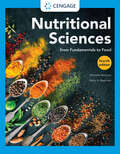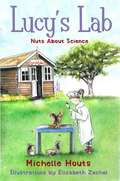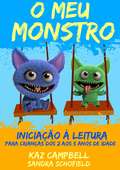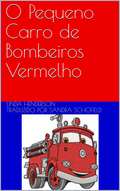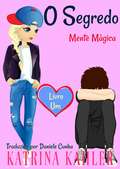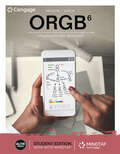- Table View
- List View
Nutritional Sciences: From Fundamentals to Food
by Michelle Shelley McGuire Kathy A. BeermanCrystal Clear, Up-to-Date Science + Compelling Applications = A Balanced Program for Teaching and Learning. Now updated with the 2020-2025 Dietary Guidelines for Americans and the latest findings from today's constantly evolving nutrition science literature, NUTRITIONAL SCIENCES: FROM FUNDAMENTALS TO FOOD, 4th Edition, clearly explains the scientific principles underlying nutrition while incorporating applications to help students develop a complete understanding of core concepts. This integrated approach provides a strong science foundation in a context relevant to students' daily lives. Supported by an impressive visual design, engaging case studies, and interactive digital resources, NUTRITIONAL SCIENCES offers a unique, balanced program for teaching and learning.
Nutritional and Herbal Therapies for Children and Adolescents: A Handbook for Mental Health Clinicians
by George M. KapalkaThis volume assists practicing mental health professionals in expanding their knowledge about nutritional and herbal interventions that can be attempted as alternatives to prescription medications. Designed to provide guidance for non-medical caregivers treating children and adolescents who present with emotional and/or behavioral difficulties such as such as depression, anxiety, ADHD, sleep difficulties, impulsivity, distractibility, and other psychological and psychiatric disorders, the volume provides a comprehensive discussion of naturopathic solutions based on existing research.
Nuts About Science: Lucy's Lab #1 (Lucy?s Lab)
by Michelle Houts Elizabeth ZechelOn Lucy’s first day of second grade, she’s excited to meet her new teacher, Miss Flippo, and find out everything’s she’s going to learn about this year in school. And when Miss Flippo tells the class that they’re going to have their very own science lab, complete with lab coats and goggles, Lucy can’t wait to start exploring.But one thing is troubling her. The tree that sat outside her first grade classroom all year is gone. Where are the squirrels going to live? Inspired by her classroom lab, Lucy starts her own research mission to find out what happened to the tree, and then to lobby for the school to plant a new one. With the help of her cousin, Cora, and their new classmates, Lucy discovers that science is everywhere you look, and a lab can be anywhere you look.Launching a new chapter book series from IRA Children’s Book Award-winner, Michelle Houts, Lucy Saves Some Squirrels draws on STEM themes and is aligned with curriculum guidelines to bring a love of science to young readers, inspiring them to start their own labs and explore their world.
O Meu Monstro 4 - Iniciação à Leitura - para crianças dos 2 aos 5 anos de idade
by Sandra Schofield Kaz CampbellSegue as aventuras do monstro no primeiro dia no Infantário; no parque; a brincar ao Doce ou Travessura e lê também sobre a festa de aniversário do monstro. Todas as histórias têm imagens para ajudar os seus filhos a compreender e a desfrutar do prazer da leitura. Há 2 secções de bónus: piadas de monstro, adivinhas e trava-línguas, bem como uma secção a explicar Como Ler Com Uma Criança Pequena.
O Pequeno Carro de Bombeiros Vermelho
by Linda HendersonO pequeno carro de bombeiros vermelho tinha uma vida feliz - até que, um dia, chegaram dois novos carros de bombeiros à sua garagem. Ele tinha a certeza de que não iria continuar a ser querido ou necessário. Descubra o que acontece ao pequeno carro de bombeiros vermelho. Esta história irá mostrar à sua criança (idade: 3-5) que, mesmo quando alguma coisa má acontece, ainda pode haver um final feliz.
O Segredo Livro 2 A descoberta
by Katrina Kahler Daniele CunhaO Segredo - Livro 2: A descoberta continua a história de suspense de Sam e seu poder especial que ele faz de tudo para esconder. Quando sua vizinha, Tess, acidentalmente descobre seu segredo, ele acredita que sua amizade com a linda garota que mora na casa vizinha chegou ao fim e ele teme o pior. Contudo, ele não esperava a reação dela e no que aconteceu! Escrito a partir do ponto de vista da Tess, essa estória irá manter o leitor ansioso da primeira à última página, onde Tess descobre mais ainda do que esperava! Este livro incrível é para garotas que gostam de ler sobre crianças com poderes únicos e sobrenaturais. Adicione drama, crises na amizade, problemas com bullying, crushes e uma pitada de romance, essa estória é para garotas de 9-12 anos e até os mais velhos irão gostar.
O Segredo - Livro 3: Poder da Mente (O Segredo #3)
by Katrina Kahler Daniele CunhaO Segredo - Livro 3: Poder da Mente é uma continuação incrível da série. Mais uma vez, inclui todos os elementos de uma ótima estória que vai manter o suspense e fazer com você se pergunte o que vai acontecer em seguida. Tess está determinada a ficar ao lado de Sam, mas será que ela será capaz de seguir com sua promessa a qualquer custo? Será que Sam será capaz de controlar a si mesmo e manter seu segredo? Essas perguntas e muitas outras serão respondidas nesse incrível livro voltado para garotas, cativante e que vai fazer você não querer parar de ler. Outra estória de drama, amizade e lealdade que irá testar os limites até o fim!
O Segredo Mente Insana Livro Um
by Katrina Kahler Daniele CunhaQuando a garota Tess de 12 anos se muda para uma nova vizinhança, ela tenta ser amiga de seu vizinho, um garoto da mesma idade chamado Sam. Tess não sabe que Sam tem um poder especial, um que ele deve manter em segredo a qualquer custo. Não, ele não lê mentes, mas ele é capaz de algo que muitas vezes ele luta para manter controle. As outras crianças acham ele estranho e tendem a evitá-lo. Mas com a chegada da Tess, tudo muda. Contudo, Sam não é o único interessado na Tess. O garoto mais popular da sala, um garoto chamado Jake Collins também a nota e Sam chega a conclusão que ele não tem chance. Então, quando o "bullying" de Jake começa a piorar, Sam é forçado a ensinar-lhe uma lição. Mas o que acontece quando o Sam vai longe demais? E a Tess descobre do que ele é realmente capaz? Se você adora ler sobre crianças com poderes especiais e se você gostou da minha série chamada "Mind Reader", então você também irá gostar dessa série. É mais uma estória empolgante cheia de drama, suspense, romance, crushes, problemas na amizade e muito, muito mais. Um livro de suspense para meninas que você não vai conseguir parar de ler.
O diário do Sr. Moreno, Alto e Belo
by Kaz Campbell Joyce Destri de AquinoEste famoso livro é parte da coleção “ Almost Cool” e do super popular “ Diary of an Almost Cool Girl” Sr. Moreno, Alto e Belo ( Sr. MAB abreviação) ... Bem, esta é Maddi Bull ( Isso mesmo, Maddi de Diary of an Almost Cool Girl) apelidada por Richard Jones. Acompanhe este diário inteiro e descubra como ele se sente com relação a Maddi e tudo mais que acontece em sua vida. Às vezes a vida pode ser difícil, especialmente se você perdeu a sua mãe recentemente num acidente de carro. Mas Maddi traz um sorriso ao rosto de Sr. MAB. Richard descobriu o relógio de bolso de sua mãe, um relógio de família antigo que tem passado de geraçao a geração. Ele tem ouvido histórias de sua avó e suas aventuras. Poderia suas histórias serem verdade? Será que o relógio tem alguma coisa a ver com estas historias? Ele vai explorá-las ou vai seguir o conselho de seu pai e deixar toda essa história de lado? Um livro perfeito para garotas entre 9 a 12 anos. Comentário Editorial Avaliações Isso é o que os nossos incríveis leitores de Amazon dizem: Eu amo! É tão incrível, inspirando em almost cool girls. Acho que você deveria escrever outro livro e outro livro de almost cool girls. Este livro mostra o Sr. Moreno, Alto e Belo tem um lado suave! Ele é tão fofo! Eu acho que este livro é realmente bom e eu acho que ele é um dos meus livros favoritos. No principio foi triste. Minha melhor amiga perdeu a sua mãe e ela leu o este livro e me disse que sentia o mesmo. Eu também gosto da ideia de Maddi escrever um diário, mas daí você pode ler o diário do Sr. MAB. Sim, eu acho que Campbel deveria escrever um novo talvez um diário de Gretel desta vez. Eu amor este livro por favor escreva outro para eu ler, muito por favor com uma cereja no topo. Obrigada bjs bjs bjs Eu ameeeei o livro você pode escrever um outro por favor porque eu amei tanto!! I love this book p
OHIO Western Studies, Grade 5
by Irma M. Olmedo Raymond C. Jones Kim PittsleyNIMAC-sourced textbook
ORGB
by Debra L. NelsonLearn Organizational Behavior YOUR Way with ORGB! ORGB's easy-reference, paperback textbook presents course content through visually engaging chapters as well as Chapter Review Cards that consolidate the best review material into a ready-made study tool. With the textbook or on its own, ORGB Online allows easy exploration of ORGB anywhere, anytime--including on your device! Collect your notes, browse interactive content and create StudyBits as you go to remember what's important. Then, either use preset study resources or personalize the product through easy-to-use tags and filters to prioritize your study time. Make and review flashcards, review related content and track your progress with Concept Tracker--all in one place and at an affordable price!
ORIGO Stepping Stones 2.0 Comprehensive Mathematics: Grade 1, Student Book A (ORIGO Stepping Stones)
by James Burnett Calvin Irons Peter StowasserNIMAC-sourced textbook
ORIGO Stepping Stones 2.0, Comprehensive Mathematics [Grade 2], Student Book A
by James Burnett Calvin Irons Peter StowasserNIMAC-sourced textbook
ORIGO Stepping Stones 2.0, Comprehensive Mathematics [Grade 2], Student Book B
by James Burnett Calvin Irons Peter StowasserNIMAC-sourced textbook
ORIGO Stepping Stones 2.0, Comprehensive Mathematics [Grade 3], Student Book A
by Beth Lewis James Burnett Calvin Irons Peter Stowasser Debi DePaul Allan Turton Donna Arnott Jaye Kelly Melanie TheedNIMAC-sourced textbook
ORIGO Stepping Stones 2.0, Comprehensive Mathematics [Grade 3], Student Book B
by Beth Lewis James Burnett Calvin Irons Peter Stowasser Debi DePaul Allan Turton Donna Arnott Jaye Kelly Melanie TheedNIMAC-sourced textbook
ORIGO Stepping Stones 2.0, Comprehensive Mathematics [Grade 4], Student Book A
by Beth Lewis James Burnett Calvin Irons Peter Stowasser Debi DePaul Allan Turton Donna Arnott Jaye Kelly Melanie TheedNIMAC-sourced textbook
ORIGO Stepping Stones 2.0, Comprehensive Mathematics [Grade 4], Student Book B
by Beth Lewis James Burnett Calvin Irons Peter Stowasser Debi DePaul Allan Turton Donna Arnott Jaye Kelly Melanie TheedNIMAC-sourced textbook
ORIGO Stepping Stones 2.0, Comprehensive Mathematics [Grade 5], Student Book A
by Beth Lewis James Burnett Calvin Irons Peter Stowasser Debi DePaul Allan Turton Donna Arnott Jaye Kelly Melanie TheedNIMAC-sourced textbook
ORIGO Stepping Stones 2.0, Comprehensive Mathematics [Grade 5], Student Book A
by James Burnett Calvin Irons Peter StowasserNIMAC-sourced textbook
ORIGO Stepping Stones 2.0, Comprehensive Mathematics [Grade 5], Student Book B
by James Burnett Calvin Irons Peter Stowasser Allan TurtonNIMAC-sourced textbook
ORIGO Stepping Stones 2.0, Comprehensive Mathematics [Grade 5], Student Book B
by Beth Lewis James Burnett Calvin Irons Peter Stowasser Debi DePaul Allan Turton Donna Arnott Jaye Kelly Melanie TheedNIMAC-sourced textbook
ORIGO Stepping Stones 2.0: Comprehensive Mathematics, Grade 1, Student Book B (ORIGO Stepping Stones)
by James Burnett Calvin Irons Peter StowasserNIMAC-sourced textbook <p>Grade 1</p>
ORIGO Stepping Stones 2.0: Comprehensive Mathematics, Grade 4, Student Book A (ORIGO Stepping Stones)
by James Burnett Calvin Irons Peter StowasserNIMAC-sourced textbook <p>Grade 4</p>
ORIGO Stepping Stones 2.0: Comprehensive Mathematics, Grade 4, Student Book B (ORIGO Stepping Stones)
by James Burnett Calvin Irons Peter Stowasser Allan TurtonNIMAC-sourced textbook <p>Grade 4</p>
